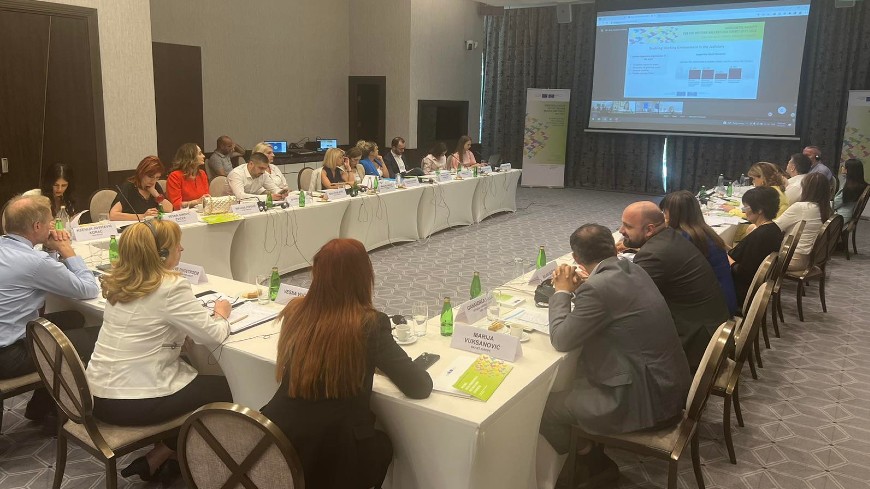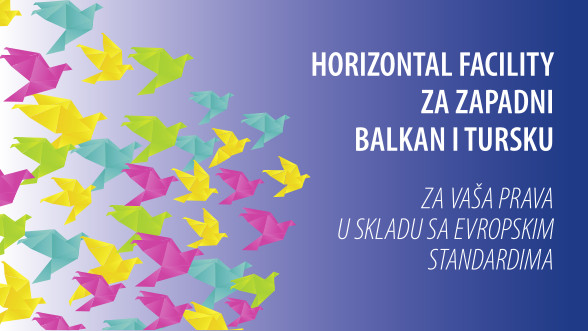Gender equality is at the core of all European Union and Council of Europe policies and actions, including those aimed at achieving more gender diverse professionals in the judiciary capable of ensuring equality for all citizens. This was one of the main messages from the Round table that was organised in Podgorica on 7 July, in collaboration with the Supreme Court of Montenegro. The round table brought together representatives of judicial institutions, the Ministry of Justice and civil society organisations in a vivid and fruitful discussion about gender mainstreaming of the judicial reform in Montenegro.
"There is no rule of law without gender equality, because the establishment of gender equality is one of the key goals and priorities of the development of every modern society", said the Acting President of the Supreme Court of Montenegro, Vesna Vučković in her opening remarks. She reiterated that the implementation of legislation remains a priority: “Given that normative guarantees are not sufficient, it is necessary to strengthen awareness of gender equality at all levels in the judiciary”, concluded Vučkovic.
"The EU has been an invaluable supporter and partner in driving forward the gender equality agenda in more than 90 countries of the world. In Montenegro, the EU strongly supports the reforms in the justice sector with the ultimate goal to enhance judicial independence, accountability and transparency and to ensure equality and justice for all", said Yngve Engstroem, Head of the Co-operation Section, Delegation of the European Union to Montenegro. He stressed out that a gender sensitive approach will have a transformative power which lies in tackling social and economic barriers that women face, but also in ensuring fair outcomes of judicial proceedings, as perceived by end-users of the justice system.
"Greater gender equality in judiciary and better understanding of gender roles have considerable effects on addressing gender bias in judicial decisions, especially in cases related to gender-based violence, and on challenging traditional gender roles in the courtrooms”, stated Elena Jovanovska Brezoska, Head of Southeast Europe Unit in the Council of Europe Co-operation Programmes Division. "Together with our partners from the EU, the Council of Europe will continue to support judicial actors in promoting equality for all and in establishing more gender diverse judiciary in Montenegro”, concluded Jovanovska Brezoska.
The main findings and recommendations from the Study were presented by Nino Janashia, Council of Europe international consultant on gender equality and human rights and the main author of the Study. In her presentation, Janashia elaborated on relevant aspects of achieving gender equality in judiciary and proposed concrete measures for gender mainstreaming of judicial policies and practices.
During the panel discussion that followed the presentation of Study, panellists from the public administration, judicial institutions and civil society stressed out the importance of gender equality in the context of judicial reform.
Bojan Božović, State secretary in the Ministry of Justice, provided an overview of the activities that the Government is implementing with respect to gender equality. He also stressed out the importance of gender mainstreaming of the new Judicial Reform Strategy, based on the recommendations from this Study.
Mirjana Popovic, judge of the High Court in Podgorica and CCJE Rapporteur for Gender Equality for 2022 emphasised her expectations that with the aim of improving the rule of law and the protection of human rights, the judiciary in Montenegro will create its own Gender Equality Strategy and Action Plan. “The judiciary also needs to develop specific Guidelines for a gender-responsive approach to judging cases of gender-based violence", stated judge Popovic.
Judge Mladen Grdinic spoke about the importance of men’s leadership for gender equality, stressing out that women judges in Montenegro are still facing barriers and gender biases in their carries, compared to judges in EU countries. He illustrated few examples from his experience, stressing out the need to have institutional solutions developed to support women judges in building their carriers.
Maja Milošević, from Judicial Training Centre, stressed out the importance of the gender equality trainings that the JTC is organising in continuity, focusing also on the implementation of the Istanbul Convention.
Sanja Elezović, local Council of Europe consultant and co-author of the Study made a clear remark that we need gender responsibility and accountability to move things forward, including in addressing gender-based violence and stereotypes that still exist in Montenegrin society.
Marko Sošić from NGO Institute Alternative stated that we are still far away from gender responsive budgeting. “Programme budgeting introduced in 2022 still suffers from lack of quality non-financial data and well-defined goals and indicators. However, judiciary has a chance to make pioneering steps towards gender sensitive budgeting, since various data on cases already exist and can serve to measure the impact. Setting up targets in this area can be beneficial for advancing gender equality in judiciary”, concluded Sošic.
In concluding remarks, Evita Aravantinou, Project Co-ordinator at the Co-operation Programmes Division stated that careers have no gender. "Montenegrin authorities have successfully understood it and strive towards it. Montenegro has been ensuring equal access and participation of men and women in the judiciary in various ways”, said Aravantinou. She stressed out that a change comes through concrete actions and reforms, building upon a very good basis that the Study on Gender Equality provides for.
The round table was organised under the action “Accountability and professionalism of the judicial system in Montenegro” which is part of the joint EU and Council of Europe programme "Horizontal Facility for the Western Balkans and Turkey 2019 - 2022".



